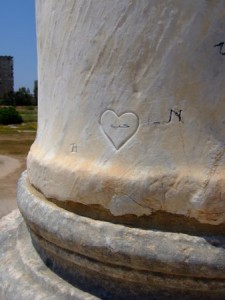The peculiarity of the family title role-reversal habit (where a father or mother calls their child ‘dad’ or ‘mum’ respectively) is compounded by the variety of parental titles in currency on the street.
Apart from the traditional mama and baba and the very common papy, many families adopt titles from their preferred foreign influence, a fruit of their own particular cocktail of schooling at the Grand Lycée Franco-Libanais, a diploma from the AUB, and/or a spell working in Washington, Montreal or Paris.
This means you also have little Lebanese kids being called “mommy” with a true Yankee drawl while the rest of the sentence may be in English, Lebanese or even French. Of course the multilingualism of the Lebanese is well documented. But surely something as intimate as what you teach your tots to call you (and therefore, in Lebanon, what you call them) would come more naturally in one’s mother tongue. Then again, one would have to be able to identify one’s mother tongue in the first place.
This declaration of love on a pillar in the huge Roman hippodrome in Tyre epitomises the east meets west phenomenon. Just as ancient Rome left its imprint on the Middle East, so does the modern west, shown in the Latin initials, while “love” itself is expressed in Arabic. From this we could simplistically derive that the language of the heart is Arabic and Western tongues influence the form but not the underlying substance.
But while this may be the case in parts of Lebanon, it is not so in the capital and its surroundings where some would have a hard time telling you what their mother tongue really was. Though some Lebanese have a base language in which they are most comfortable, they often have different ‘first’ languages for different situations. The names of herbs and vegetables may come quickest in Lebanese, but they may be more at ease writing in French than Arabic, and they may find socialising in English the most natural thing, using more American slang than slang of any other language.
A Lebanese is likely to have in his vocabulary words in each of the languages he speaks which he would not readily translate into the other languages, though he may speak them proficiently. There is no Académie libanaise creating new Lebanese or Arabic words for new technological or social inventions, although the movement Feil Amer might like to see one.
On the contrary, since Lebanese is not hindered by a fixed written form, it evolves rapidly by generous adoption. It orders el-delivery to eat while watching el-mondial. These words could be translated, and are translated into Arabic by traditional media, but they reach Lebanese lips first and foremost in their language of origin. On the other hand, zaater is zaater (no-one would dream of calling it thyme, especially as it often refers to a mix with other herbs) and khallas is khallas.
Just hearing more than one language from a young age makes children more likely to appropriate languages to themselves and to feel at ease using them whether with strangers or in intimate family situations. There is none of the embarrassment and self consciousness over speaking a foreign language that the Brits suffer from. On the contrary, this type of multilingual exposure often results in great ease in foreign languages even when they have a limited vocabulary or poor grammar or a terrible accent. This begs a new definition of fluency.

First of all I would like to state that as a fellow expat who has recently moved back to Lebanon, reading your blog has brought me great pleasure. Often I find the same observations and most of the topics you write about I can relate to.
Secondly, I am still a student and was wondering if I could refrence certain parts of your writing because the way you phrased certain occurences and observations is admirable. Of course all due credit will be given.
Thank you for such an enjoyable blog, I now have most of my family frequently reading your posts as well.